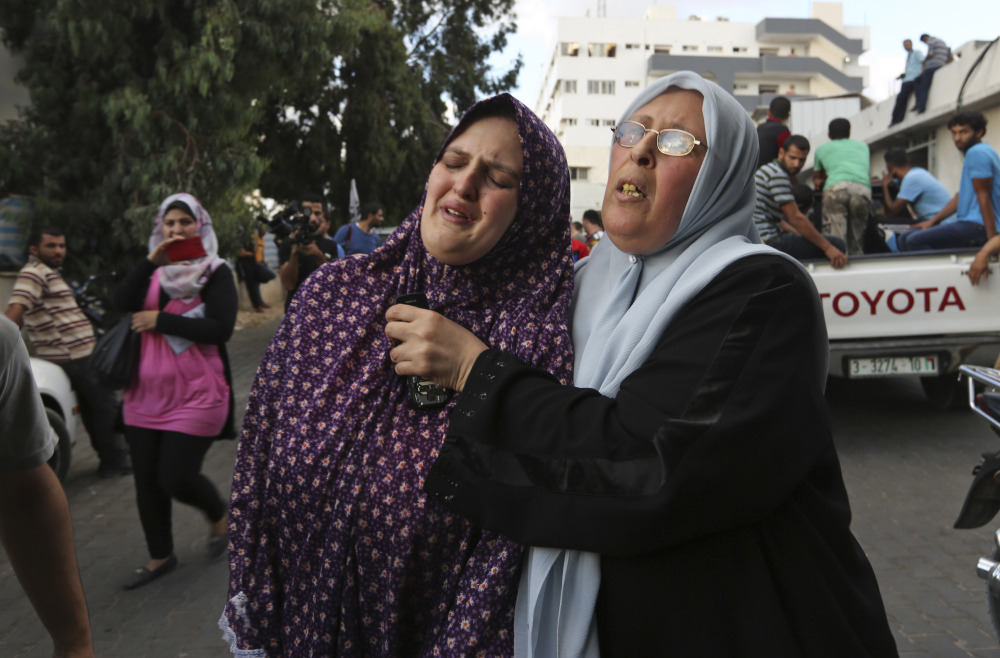WASHINGTON — The Obama administration on Thursday voiced its strongest caution yet to Israel not to take the bombardment of Gaza too far.
“We are increasingly concerned about the safety and security of civilians on both sides. We continue to urge all parties to do all they can to protect civilians, and we have been heartbroken by the high civilian death toll in Gaza,” said State Department spokeswoman Jen Psaki, speaking before Israel launched a ground invasion.
She highlighted the deaths Wednesday of four Palestinian boys playing on a beach, calling news reports and footage of the scene “horrifying.”
“The tragic event makes clear that Israel must take every possible step to meet its standards for protecting civilians from being killed,” Psaki said. “We will continue to underscore that point to Israel.”
Secretary of State John Kerry “has made that point directly as well,” Psaki said.
That pointed warning reflected a deliberate pivot by Washington after more than a week of strong U.S. support of Israel’s position that the aerial assault on targets associated with the Palestinian militant group Hamas in the Gaza Strip was a necessary defensive action.
The boys’ deaths, which Israel has not fully explained, appeared to be a turning point. Psaki spoke hours before Israel launched a ground offensive against Hamas militants inside Gaza, something the United States had said it hoped would be avoided.
“The Israelis have expressed their sorrow and regret in these cases,” Psaki said of the boys’ deaths. “What we’re asking for is a redoubling of efforts, moving forward, to prevent civilian casualties, given the events of the last couple of days.”
She reiterated U.S. condemnation of what she called “indiscriminate rocket attacks” targeting Israeli civilians and affirmed U.S. support of Israel’s right to defend itself.
The boys died when an Israeli gunboat off Gaza’s Mediterranean coast fired at the beach. Israel said it was targeting Hamas operatives and called the civilian deaths unintended and tragic.
Israel accuses Hamas of hiding weapons caches in homes and mosques and using civilians as human shields.
International criticism of Israel for its actions during this 10-day campaign has been milder than during past conflicts, including the 2012 bombardment of Gaza that killed fewer civilians and ended with a cease-fire brokered in large part by the United States. That began to change late Wednesday and Thursday, as U.S. statements reflected.
“Civilian toll of Gaza crisis is heartbreaking,” United Nations Ambassador Samantha Power tweeted Thursday. “U.S. using all diplomatic resources to support cease-fire, protect civilians, avoid escalation.”
Kerry spoke to Israeli Prime Minister Benjamin Netanyahu on Thursday and has made numerous other calls, including to officials in Egypt and Qatar, seeking ways to apply pressure on Hamas militants to stop their rocket attacks on Israel, the State Department said.
The secretary abruptly canceled a planned address to an American Jewish audience Thursday evening.
On Wednesday, Kerry had said the United States wants “a legitimate cease-fire” and an end to “the conflict and killing.”
Netanyahu had agreed to an Egyptian-drafted cease-fire a day earlier, despite political opposition at home, but Hamas spurned the offer. Kerry told Netanyahu in a phone call Wednesday that “there’s more that can be done” by Israel to avoid civilian casualties, Psaki said.
Send questions/comments to the editors.



Success. Please wait for the page to reload. If the page does not reload within 5 seconds, please refresh the page.
Enter your email and password to access comments.
Hi, to comment on stories you must . This profile is in addition to your subscription and website login.
Already have a commenting profile? .
Invalid username/password.
Please check your email to confirm and complete your registration.
Only subscribers are eligible to post comments. Please subscribe or login first for digital access. Here’s why.
Use the form below to reset your password. When you've submitted your account email, we will send an email with a reset code.